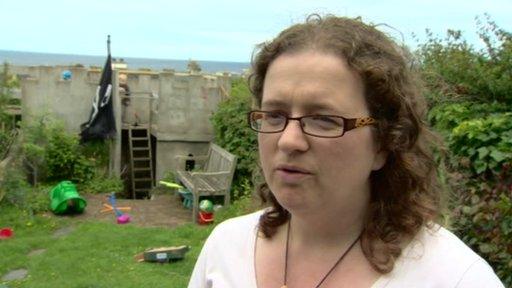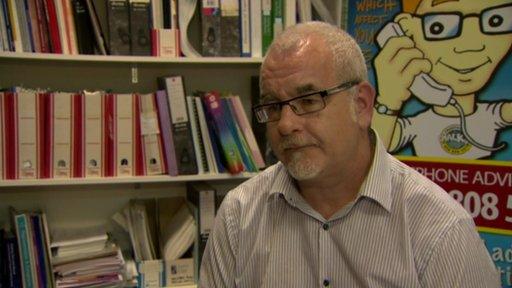Home school parents angry over plans to monitor their teaching
- Published
Sarah Dickinson educates her three children at home in Portstewart and is opposed to the proposals to change the way home schooling is monitored
Parents in Northern Ireland who want to educate their children at home are angry at new guidance which could see their teaching being monitored by education boards.
They have gathered support from politicians and are lobbying the authorities.
The parents believe their freedom to teach their own children could be infringed.
No-one knows how many children are being home-schooled in NI.
They only come to the notice of the authorities if children have attended school at some point or the family identifies itself.
Two hundred and fifty are registered with education and library boards, but the actual figure is likely to be much higher.
Sarah Dickinson educates her three children at home in Portstewart.
She also runs a home education website, external and is leading opposition to proposals to change the way home schooling is monitored.
'Flexible and responsive'
"Parents are trying to provide an excellent education and I definitely think home schooling can be that," she said.
"It's very flexible, responsive to the needs of the child and it can be a lot of fun."
There is nothing to stop parents not sending their children to school, but the law says they must provide an appropriate education for their children.
The Education (Northern Ireland) Order 1986 says: "The parent of every child of compulsory school age shall cause him to receive efficient full time education suitable to his age and aptitude...."
All five education boards have different guidelines for monitoring home schooling, some more rigorous than others.
The new guidelines are an attempt by them to standardise the advice, but they have caused uproar among some home schoolers.

Joanne Courtney from Moira also educates her three children at home and said it was working "extremely well"
Parents have different reasons for choosing home schooling.
Some fundamentalist Christians object to the way subjects are taught in the Northern Ireland curriculum, some have had disputes with schools and some children who have been bullied decide to opt-out of school.
Others prefer the flexibility of home schooling.
Joanne Courtney from Moira also educates her three children at home.
"It's working extremely well, the children are very interested in learning things and we try not to hamper them. We don't push them too much towards formal education, we follow what they are interested in all the time," she said.
Some studies have shown that, while children who are home schooled may be slow to learn to read, they quickly catch up later.
The authorities can advise parents, but have no rights to get access to homes or tell parents what they should teach.
Opposition
The proposed guidelines, which are being consulted upon, will attempt to standardise the guidance and say board officers should ensure families are visited at least once a year to monitor the education being provided.
That is being opposed by home educators like Sarah Dickinson who interpret that as unwelcome intrusion.
"I object to them treating parents as if they were a risk to their children... I think parents are the best advocates for their children and they should be treated with respect," she said.
It's believed the authorities, including the minister for education, have been bombarded by complaints from parents.
John O'Dowd said he was keeping an open mind, but that children's needs have to be paramount.
"I have a concern that the vast majority of people who have spoken on this matter in the assembly have spoken of the needs of the adult and not of the child... in what way do you reassure yourself that being home educated is being properly home educated?"

Liam Mackle from the CLC said parents should not be worried about the planned changes
However, he said he regretted that the education and library board did not show him the consultation document before issuing it.
The Children's Law Centre (CLC) has welcomed the proposed changes and said it sees no threat to parents in it.
Liam Mackle is the CLC's advice manager: "There is no planned change to the law to allow education and library boards the right to enter a person's home. I think the parents are wrong to worry about that."
In fact, the CLC said clearer guidelines and advice on schooling should be welcomed by families who are home educating their children.
The consultation, which is being managed by the North Eastern Education and Library Board, closes on Friday 27 June.